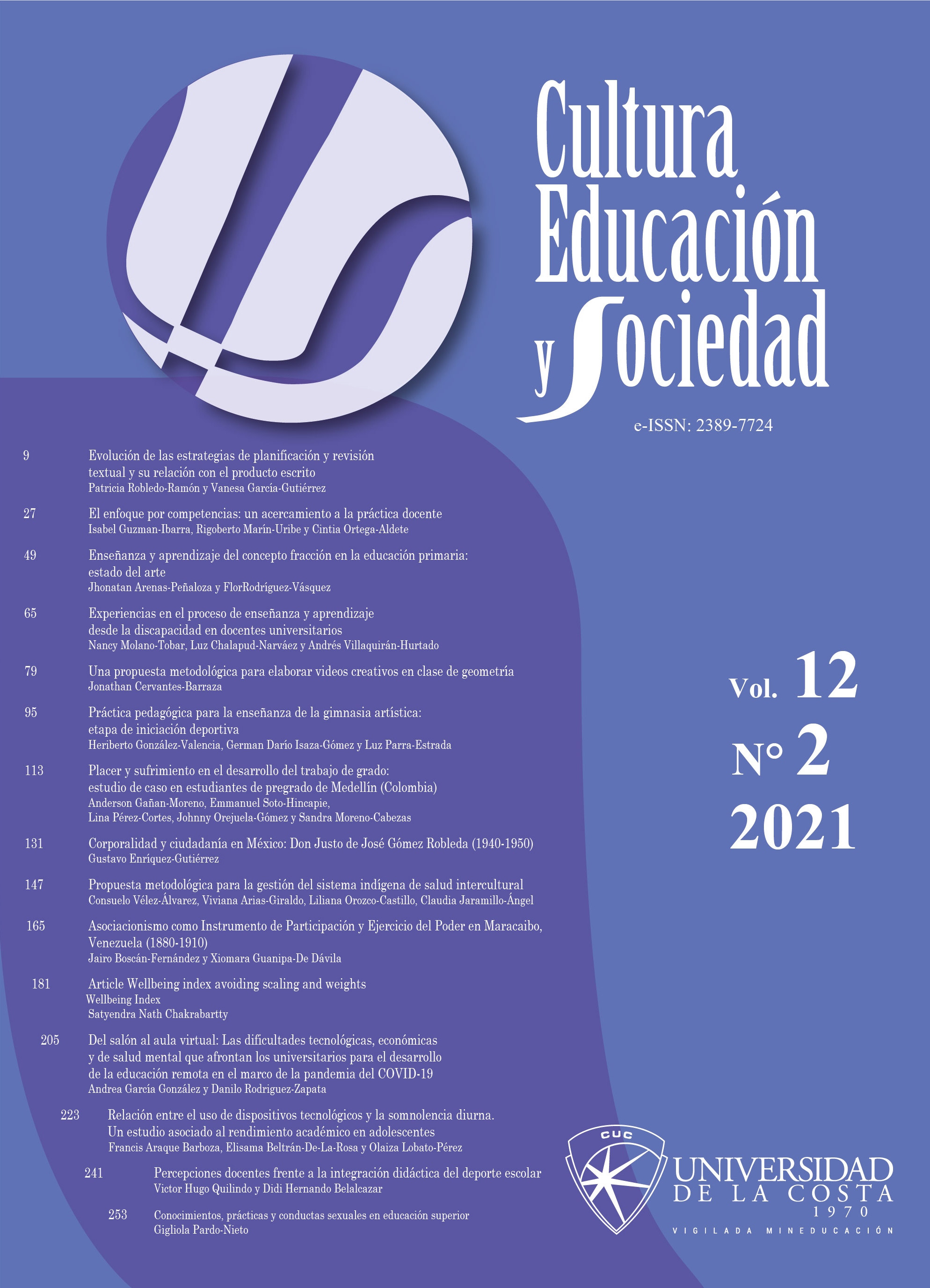Associationism as an instrument of participation and exercise of power in Maracaibo, Venezuela (1880-1910)
DOI:
https://doi.org/10.17981/cultedusoc.12.2.2021.10Keywords:
Associationism, Instrument of participation, Public space, Exercises of powerAbstract
The article interprets the phenomenon of associationism as an instrument of power in the economic actors of Maracaibo (Venezuela) in the period 1880-1910, supported by the advancement of a modernization policy and the granting of greater scope to individual freedom. From these practices, a close relationship is formed between State officials and English, German, and French investors, proposing the financing and execution of works for the public welfare. This reality expresses the ideological development of the maracaiberos of the time, linked to the penetration of liberalism and positivism as currents of thought. The research is of an explanatory hermeneutical nature, whose data emanate from the Historical Archive of Zulia (Venezuela), Center for Historical Documentary Research of Zulia and secondary sources. The results allow us to understand the meaning of associationism in the geo-historical marabina region as a tool to promote social practices and cultural patterns, from which a conception of public space emerges for the enjoyment, the realization of works and the exercise of power, protected in an altruistic discourse aligned with the preaching of the common good. It concludes in a notion of power associated with terms of production that superimposes freedom over repression, promotion over prohibition, and reward over punishment.
Downloads
References
Apreda, G. (2004). La Concepción de Sujeto en Michel Foucault. La Plata: Universidad Nacional de la Plata Argentina.
Archivo Histórico del Estado Zulia. (1904). Logia Regeneradora N° 6. [Comunicación al Dr. Regulo Oliveros]. Maracaibo: Tomo 33, Legajo 12.
Archivo Histórico del Estado Zulia. (1897). Sociedad Auxiliar de Artesanos. [Comunicación dirigida al Dr. Alejando Andrade]. Maracaibo: Tomo 14, Legajo 21.
Archivo Histórico del Estado Zulia. (1883). Fundación sociedad de Amigos del País. [Comunicación]. Maracaibo: Tomo , Legajo .
Beresñak, F. (2011). Michel Foucault y su metodología histórico-filosófica. Revista digital Synesis, (2), 8–16.
Bernaus, M. (2000). Barcelona y los Gremios. [Online]. Disponible en https://www.liceus.com/barcelona-y-los-gremios/
Cabrera, G. (2004). Fiestas Nacionales y Opinión Pública en Maracaibo (1834-1862). [Trabajo Magístral]. Universidad de Zulia, Maracaibo, Venezuela.
Calderón, M. (2013). Hacia una Pedagogía Hermenéutica desde una Hermenéutica de la Educación. [Disertación licenciatura]. Pontificia Universidad Católica del Ecuador, Quito, Ecuador. Disponible en http://repositorio.puce.edu.ec/handle/22000/7067
Cardozo, G. (1991). Maracaibo y su región histórica. El circuito agro-exportador 1830- 1860. Maracaibo: Universidad Del Zulia.
Cazzato, S. (1998). Elite, Poder y Espacio Público en las SociedadesMaracaiberas (1833-1846). [Tesis Magístral]. Universidad del Zulia. Maracaibo, Venezuela.
Dilthey, W. (1949). Introducción a las ciencias del espíritu. [2 Ed.]. México, D.F.: Fondo de Cultura Económica.
Fundación Polar. (1998). Diccionario Multimedia de Historia de Venezuela. Caracas: Empresas Polar. Disponible en https://bibliofep.fundacionempresaspolar.org/dhv
Gadamer, H. (2000). Verdad y Método. Salamanca: Sígueme.
Guerra, F. (1998). Modernidad e independencias. Ensayos sobre las revoluciones hispánicas. México, D.F.: MAPFRE.
Maza, E. (2003). Asociacionismo en la España Contemporánea. Valladolid: Universidad de Valladolid.
Ortiz, A. (2015). Maracaibo. Ciudad de 3 Fundaciones. Cabimas: UNERMB.
Rivas, J. (1962). El Comercio de Maracaibo. Maracaibo: Editorial del Lago.
Rubio, L. (2007). Honor e identidad en Maracaibo a fines del siglo XIX. Opción, 23(52), 25–44. Disponible en https://produccioncientificaluz.org/index.php/opcion/article/view/6397
Reales Sociedades Económicas de Amigos del País. (1883). Decreto de Creación de la Sociedad. [Online]. Disponible en http://www.amigosdelpais.es/quienes-somos-2/
Urdaneta, A. y Pineda, N. (1988). Acuerdos, Leyes y Decretos de la Asamblea Legislativa del Estado Zulia. 1857-1908. Maracaibo: Asamblea Legislativa del Estado Zulia/Centro de Estudios Históricos./Universidad del Zulia. Disponible en https://www.sudoc.fr/107977761
Urdaneta, A. (2001). Federalismo y Gobierno Federal en el Zulia (1811-1870). [Tesis doctoral]. Universidad del Zulia, Maracaibo, Venezuela.
Published
How to Cite
Issue
Section
License
Copyright (c) 2021 CULTURA EDUCACIÓN Y SOCIEDAD

This work is licensed under a Creative Commons Attribution-NonCommercial-NoDerivatives 4.0 International License.
![]()
Creative Commons 2020 CULTURA EDUCACIÓN Y SOCIEDAD
This article is under international license Creative Commons Reconocimiento-NoComercial-SinObrasDerivadas 4.0.
The published articles are the sole responsibility of their authors and do not necessarily reflect the opinions of the editorial committee.
CULTURA EDUCACIÓN Y SOCIEDAD respects the moral rights of its authors, who assign to the editorial committee the patrimonial rights of the published material. In turn, the authors inform that this work is unpublished and has not been previously published.
All articles are under a:
Licencia Creative Commons Atribución-NoComercial-SinDerivadas 4.0 Internacional.
![]()


 English
English
 Español (España)
Español (España)




_12.53_.27_p_. m_._3.png)





_12.57_.35_p_. m_._3.png)
_12.50_.37_p_. m_._3.png)



